2021 NAEd/SPENCER DISSERTATION FELLOWS
Irteza Binte-Farid, University of Pennsylvania

.Irteza Binte-Farid is a joint degree student in Education and Anthropology at the University of Pennsylvania, studying the experience of Muslim youth in Philadelphia high schools and religious spaces. Irteza holds a B.A. in History from Stanford University. During undergrad, Irteza had the opportunity to study abroad in Capetown and Oxford. It was during her time volunteering at a township school in Khayelitsha township that Irteza first realized that educational research, as it pertained to race and class, was an important field of study, particularly in the ways that educational systems directly shaped student futures. In order to further understand how students’ and teachers’ everyday practices were shaped by larger forces, Irteza pursued an M.Ed. in Educational Policy at the Harvard Graduate School of Education. However, even while receiving a firm understanding of US education policy, Irteza realized that she wanted to study more of the processes of how students navigated intersectional identities through their everyday experiences.
Irteza next joined the Education, Culture, and Society Ph.D program at Penn. She taught African American history in a West Philadelphia neighborhood school to understand the realities of classroom experiences in the city. Currently, Irteza’s dissertation examines how black Muslim youth in the Philadelphia Public Schools draw on Islamic practices, racialized experiences, and ethnic histories to construct individual identities, that in turn, shape their future aspirations. Irteza is also interested in the education of secondary history teachers and in particular how teacher education programs approach the teaching of history in culturally diverse classrooms.
“My ancestors could do this, so I have to keep going with it”: Historical Narratives, Faith Practices, and Civic Engagement amongst Black Muslim Youth in Philadelphia
In this dissertation, I investigate how black Muslim youth with different ethnic histories engage with one another in the history classroom and in their communities. I offer a case study of how students draw on their family histories to expand notions of blackness across the diaspora, bring their Islamic identities into the classroom to supplement what the curriculum does not offer, and acknowledge the importance of black history over Eurocentric narratives. I followed 30 black Muslim youth in and out of history classrooms for two years in two charter schools in Philadelphia. I utilized qualitative methods, such as participant observations, semi-structured interviews, focus groups, and social media analysis. I was particularly attuned to how students drew on their racial, ethnic, and religious identities to form historical understandings around topics such as slavery, the Civil Rights Movement, Black Lives Matter (BLM), and the COVID-19 pandemic.
I found that ethnic identities contributed to divergent interpretations of black history and BLM amongst African American and West African youth, while engaging in Islamic practices together created friendships that formed the basis for civic engagement. Examples from this study can show teachers how acknowledging the diversity of black youth’s identities can counter essentialization of black experiences while also creating productive learning spaces. Teachers can empower students to challenge anti-Blackness and Islamophobia through historical examples. Additionally, black Muslim students can be taught to acknowledge historical difference, find common ground with peers through racial and religious bonds, and aspire for hopeful futures where black lives truly matter.
Rene Armando Crespin, Cornell University
.Rene Crespin is an applied microeconomist and Ph.D. Candidate at Cornell University. His research applies econometric methods to examine topics at the intersection of education, immigration, and housing. Rene’s dissertation focuses on the causal effects of education and immigration policies on residential and school choices and access. In addition to drawing from relevant theoretical and empirical research, Rene’s work is inspired by his own experiences as the son of immigrants growing up in the South Side of Chicago.
During his academic career, Rene has also worked to improve diversity in academia through various initiatives. He is a co-founder of Diversity in Cornell Economics (DICE) and he was a teaching fellow with the American Economic Association’s Summer Program (AEASP), which aim to prepare undergraduates from underrepresented backgrounds for doctoral programs in economics and related fields.
Prior to attending Cornell, Rene was a research assistant at the University of Michigan’s Ford School of Public Policy. Before that, he was a research analyst at the University of Chicago’s Consortium on School Research. Rene graduated from the University of Michigan – Ann Arbor with a M.S. in Applied Statistics and from the University of Chicago with a B.A. in Economics.
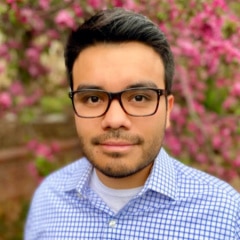
The Effects of Publicizing School Climate Information on School and Neighborhood Choice
Recently, an increasing number of states, school districts, colleges, and universities have begun to focus on the social, learning, and working conditions experienced by students, families, and teachers as a component for school improvement—making this one of the biggest current issues in education policy. Although a growing number of educational institutions seem to value their institutional climate, causal research on how much stakeholders value this is limited. In this project, I study how an initial public release of school climate ratings in Chicago, Illinois affected families’ willingness to pay for homes zoned to better-climate schools, and how student and teacher sorting patterns reacted to the information. I use two natural experiments in a difference-in-differences framework and in a regression discontinuity design to isolate the causal effects of school climate information. Furthermore, I discuss the heterogeneity of effects by race, ethnicity, income, and neighborhood/school characteristics, as well as the potential mechanisms of my findings. This research has strong implications on school choice including both school and neighborhood sorting, which have potential impacts on districts’ tax bases.
Cauê Dobbin, Stanford University

Cauê Dobbin is a Ph.D. student in economics at Stanford University, with a research focus on the economics of education and its relationship with inequality and development. His work combines economic theory and big data to shed light on some of the most pressing issues of our time, such as student loans, migration restrictions, and affirmative action. Dobbin has taught a wide range of courses in economics at Stanford, which recognized him with an award for outstanding teaching in 2019. He holds a B.A. from the University of Brasilia and an M.A. from the Pontifical Catholic University of Rio de Janeiro, both in economics.
Financial Aid, and the Supply and Demand for Higher Education
Governments use student loans to promote access to higher education worldwide. However, the net increase in access can be substantially smaller than the number of beneficiaries, for at least two reasons. First, some of the beneficiaries would otherwise pay out-of-pocket. Second, institutions may raise tuition or reduce student aid. In my dissertation, I investigate the equilibrium effects of government-funded student loans and use my findings to propose an efficient allocation of these loans. I exploit a drastic contraction in the Brazilian student loan program. I show that institutions responded to the contraction by reducing tuition and offering additional scholarships. Our results suggest that 65% of loan beneficiaries would enroll in the same degree in the absence of federal loans. I then develop a model of the supply and demand for higher education, which I estimate by leveraging natural experiments created by discontinuities in the rule that allocates government loans. Using this framework, I show how governments can allocate loans to promote access at a lower fiscal cost.
Nicole Freeman, Ohio State University
Nicole Freeman is a Ph.D. candidate in History at the Ohio State University. She specializes in twentieth-century East Central European history and her research interests include children, families, migration, and displacement in the aftermath of war and genocide. Currently, Nicole is completing her dissertation titled “Our Children Are Our Future”: Child Care, Education, and Rebuilding Jewish Life in Poland After the Holocaust, 1944 – 1950. It is based on extensive research completed in archives and libraries across Poland, Germany, Israel, and the United States. Nicole has received grants and fellowships from the Fulbright-Hays, Yad Vashem, Hadassah-Brandeis Institute, Auschwitz Jewish Center, American Jewish Archives, and Bradley Foundation as well as the Ohio State University’s Melton Center for Jewish Studies, Polish Studies Initiative, and Global Mobility Project.
She received her M.A. in History from the Ohio State University in 2015 and B.A. in History and Secondary Education from Salem State University in 2012. Prior to entering graduate school, she held an internship in the Division of the Senior Historian at the US Holocaust Memorial Museum in Washington, DC.
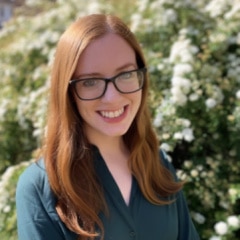
“Our Children Are Our Future”: Child Care, Education, and Rebuilding Jewish Life in Poland after the Holocaust, 1944 – 1950
My dissertation examines the rehabilitation and education of Polish Jewish children after the Holocaust. I argue that schools, summer camps, and children’s homes in Poland were national and international sites for the rehabilitation of child survivors; therefore, they served as laboratories and arenas for debates regarding Polish Jewry’s future. By comparing Zionist and non-Zionist institutions of child care, I illustrate how educators and caretakers engaged with competing ideologies to create normalcy in the best interests of the children. Rehabilitation was not just physical or mental; it required Jewish children to develop skills that would make them independent and good citizens. What did they study? What did they read? Did they learn Yiddish or Hebrew in school? Did they speak Polish in the classroom? The answers to these questions have broader implications regarding the reconstruction of Jewish communities in Poland after the Holocaust. While the Central Committee of Jews in Poland desperately fought to keep Jewish children in Poland, Zionist organizations saw no future for Jews in Poland. Through an analysis of correspondences, meeting minutes, educator conference programs, lesson plans, children’s own homework assignments, memoirs, and oral histories gathered through multi-sited archival research, my dissertation exposes tension between organizations and traces how the Central Committee of Jews in Poland’s pedagogy and ideology drastically evolved under the growing influence of Poland’s communist government. Ultimately, studying education as a form of nation-building enhances our understanding of the delicate nature of rebuilding Jewish life after war and genocide.
Laura Fries, University of California, Los Angeles
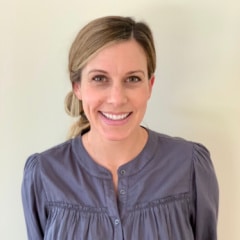
Laura Fries is a Ph.D. student in Developmental Psychology at the University of California, Los Angeles. Her research interests center on the cognitive and affective factors that influence teaching and learning, guided by a pervasive problem: students often leave our classrooms unable to apply what they have learned to real-world situations, despite this being a foundational goal of our education system. As part of a larger project focused on improving an introductory statistics curriculum, Laura’s current work examines the effects of instructional strategies designed to support students’ development of usable knowledge. She holds a B.A. in Psychology from the University of California, Santa Barbara, and a teaching credential and M.A. in Education from California Lutheran University. Prior to her doctoral studies, Laura worked as a teacher in Los Angeles.
Testing the Practicing Connections Framework: A Core-Concept Intervention to Promote Understanding in Introductory Statistics
Students’ failure to transfer what they learn to new situations is one of the fundamental problems facing education. Research suggests that transferable knowledge is characterized by connectedness and coherence. This dissertation asks how we can facilitate students’ development of coherent, transferable knowledge in complex domains.
This study explores one approach, suggested by the Practicing Connections Framework (Fries et al., 2020). According to this framework, transferable knowledge results from repeated practice not of individual skills and concepts, but of the connections that create domain coherence: connections between core concepts, key representations, and the range of contexts to which the knowledge is intended to apply.
In a mixed-method, random-assignment experiment conducted in multiple sections of an undergraduate statistics course, students are assigned to either an experimental version of a research-instrumented online textbook, which includes 24 supplemental videos designed to facilitate such connections, or a control version. The interactive textbook and course setting provide rich data, including pre-measures (e.g., demographic information), process-measures (e.g., viewing proportions), and learning outcomes (e.g., 1200+ assessment items). Specifically, this study asks: 1) how students engage with the connection-highlighting instructional video embedded in online text, 2) how the intervention impacts course learning outcomes, and 3) if the intervention promotes the development of more transferable knowledge.
This study aims to contribute to our understanding of knowledge development in complex domains over extended periods of time, with implications for instructional routines and future learning research methodologies.
Rosalinda Godinez, University of California, Berkeley
Rosalinda is a Ph.D. candidate in Social and Cultural Studies at the University of California, Berkeley. As an educational ethnographer, her research interweaves critical, interdisciplinary, and Chicana/Latina feminist perspectives to learn more about how people teach and learn in various contexts. Rosalinda considers education as the social and cultural practice of movement, imagination, and community. Her work is deeply rooted in social justice orientations, lived experiences, and her desire to establish collaborative partnerships that honor the literacies (as social practice) of womxn and communities of color.
Rosalinda holds an M.A. in Education from the University of California, Berkeley, and a B.A. in Sociology from Washington State University. Throughout her tenure as a graduate student, she has contributed to an educational ethnographic project in an elementary school in the larger San Francisco area and has taught Sociology courses at Hartnell College.
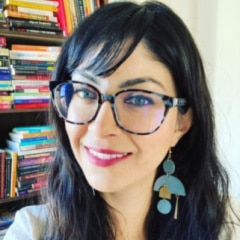
Mexicana/Latina Campesinas Cultivating Knowledge: A Collective Agri-Land-Based Education in Rural Washington State
In her collaborative ethnographic project, Rosalinda documents Mexicana/Latina Campesinas’ agricultural land-based education. Agricultural land-based education encompasses Mexicana/Latina Campesinas’ fil (field) literacies or examples of how they read, act, move within agriculture while simultaneously working and teaching with each other and their children. She articulates Mexicana/Latina Campesinas’ teaching practices as pedagogies of barbiar (harvest)–a powerful teaching practice that aims to be co-embodied, experiential, and spiritual to relate to the land, the crops, and womxn’s bodies as the content and teacher itself from which one can learn. Importantly, Rosalinda argues that through Mexicana/Latina Campesinas’ engagements and movements, they are demonstrating not to be passive workers but intersectional social actors that create teaching moments, knowledge, and new identities to live and work with dignity. Given that this project is invested in collaborative efforts and narrative claiming, she relies on participatory (Irizarry & Brown, 2014) and art-based research methodologies (Leavy, 2017) to gather the women’s testimonios (Delgado Bernal, Burciaga & Flores Carmona, 2012) and creative poetry as opportunities to re/claim identities, stories, and education systems.
Nona Gronert, University of Wisconsin-Madison
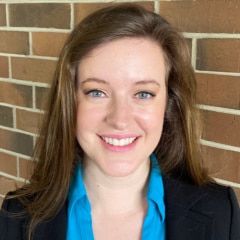
Nona Gronert is a Ph.D. candidate in Sociology at the University of Wisconsin–Madison. She is also affiliated with UW–Madison’s Sexual Violence Research Initiative. Her research explores the intersection of law, organizations, social movements, and gender. She studies sexual violence and sexual consent in U.S. higher education. Her dissertation uses a historical case study of one university to explore how strategies to address sexual violence are institutionalized, and how Title IX implementation has become part of student expectations, university structures, and administrators’ careers. Her other current project investigates how study abroad professionals perceive and address sexual harassment and sexual assault among university students enrolled in German study abroad programs. In addition to a NAEd/Spencer Dissertation Fellowship, her research has been supported by UW–Madison’s Center for Research on Gender and Women, Institute for Legal Studies, Institute for Regional and International Studies, and Center for German and European Studies. Nona received her B.A. with honors in both Sociology and Spanish Literary Studies from Occidental College.
The Promise and Peril of Title IX Addressing Sexual Violence: A University Case Study, 1972-2017
My dissertation explores the effects Title IX has had on universities in addressing sexual violence. Title IX has transformed universities and curtailed other forms of gender discrimination, such as increasing funding for women’s sports, yet it has had less of an impact on sexual violence. Even though universities now devote considerable resources (staff positions, funding, policies, trainings) to prevent and respond to sexual violence as a problem of educational inequity, the incidence of sexual violence at universities has not substantially changed. I use newspaper and archival data supplemented by interviews to investigate the changes in activist demands, government policy, and administrative strategies to address sexual violence on one university’s campus from 1972 through 2017. The project (1) documents the changes at one university, paying attention to the interplay between activism, policy responses, and legal measures; (2) compares across time the institutionalization of strategies to address sexual violence; and (3) focuses on all members of the campus community, including staff, faculty, students, and administrators, to illustrate how their perspectives on sexual violence and Title IX enforcement were expressed and transformed. The research contributes to our understanding of current debates over sexual violence and Title IX in higher education by focusing on processes within a single university over time. The project highlights both barriers and facilitating structures for addressing campus sexual violence, providing research-based evidence on strategies for achieving gender equality in higher education.
Alberto Guzman-Alvarez, University of Pittsburgh
Alberto Guzman-Alvarez is a Ph.D. student in the Department of Educational Foundations, Organization, and Policy at the University of Pittsburgh, School of Education. Proudly raised by Mexican immigrant parents, Alberto approaches his research through his experience as a first-generation student, believing that data can be a tool for social justice. His research focuses on applying and developing quantitative methods for evaluating the effectiveness of education policies and interventions. In particular, he is interested in college access issues affecting first-generation, historically marginalized students. He is broadly interested in educational data science, computational social science, and causal inference. In his dissertation, he merges his methodological and policy interests by developing new methods for evaluating quasi-experimental interventions with high-dimensional data and applying these methods to a large-scale college access intervention.
He has published both methodological and policy-focused articles in journals such as Educational Evaluation and Policy Analysis and the Journal of Research on Educational Effectiveness. In his recent policy manuscript, he and his co-author analyzed the administrative cost to colleges and universities of the FAFSA verification mandate. This work has received national attention and has been cited in a congressional committee hearing on college access.
He is the K. LeRoy Irvis Pre-Doctoral Fellowship recipient and was recognized as an Equity and Inclusion Fellow by the Association for Public Policy Analysis and Management (APPAM). Prior to his doctoral studies, Alberto earned his B.S. in Psychology from the University of California, Davis, and a Masters in Research Methodology from the University of Pittsburgh.

Deep Learning for Investigating Causal Effects with High-Dimensional Data: Analytic Tools and Applications to Educational Interventions
Quantitative education research has the potential to be revolutionized by recent developments in machine learning. Realizing these possibilities, however, requires scholars to bridge the worlds of educational research and computer sciences. Through my dissertation, I aim to merge advances in deep learning and causal inference to enable researchers to assess program impacts using quasi-experimental methods with high-dimensional data. First, I will develop a new analytical procedure incorporating advances in Deep Learning, specifically Deep Neural Networks, to estimate propensity scores with procedures that flexibly accommodate both high-dimensional data and complex relationships between treatment selection and observable characteristics. Preliminary results suggest that these methods outperform most traditional modeling strategies, particularly when complexities (e.g., non-linearities, interactions) are present in the selection model. Second, I will incorporate this approach into a causal mediation framework that employs a propensity score-based weighting strategy to allow researchers to test potential mechanisms underlying treatment effects. In addition to the methodological contributions, my dissertation also will make substantive contributions to the applied literature. I will employ these methods to evaluate a large-scale college access intervention that offered high school students critical supports to ease their transition into college during the COVID-19 pandemic. In addition to academic papers, I will produce an open-source R package to allow applied researchers to conveniently implement my method.
Mariah Harmon, Vanderbilt University

Mariah Harmon is a Ph.D. candidate in the Department of Teaching and Learning at Vanderbilt University’s Peabody College. Her research examines how teacher education programs can better center the developmental needs of minoritized teachers. Specifically, she focuses on supporting Black women pre-service teachers (BWPSTs) as they prepare to enter their classrooms. BWPSTs (along with other minoritized teachers in U.S. schools) must contend with two essential dilemmas: How do you become an agent of power in a system that has historically done harm to people like you? And, how do you become a disruptor in a system that has benefited you? Her work expands current scholarship outlining BWPSTs’ vast experiential knowledge by focusing on the development of such knowledge into pedagogical competence. Using social design methodologies, she created a teacher education counterspace for BWPSTs as they explored different aspects of becoming critically conscious educators, reflecting on their personal histories and hopes for their own classrooms. Using Black feminist theory and learning sciences, her dissertation examines BWPSTs’ learning through analysis of fieldnotes, meeting transcripts, and participant interviews.
Prior to her doctoral studies, Mariah was a middle school English/Language Arts Teacher in Okolona, Mississippi, teaching in the same school as her grandmother 40 years before. Outside of research, Mariah enjoys playing golf, going to brunch, and spending time with her husband and toddler. She received an M.A. in Education from the University of Mississippi and her B.A. in Political Science and Sociology from Vanderbilt University.
Cultivating Community through Black Womanhood: An Exploratory Study of Black Women Pre-Service Teachers
For years, educators have championed numerous strategies for supporting marginalized students in U.S. schools. Recently, researchers have identified racial matching—ensuring teachers of color work with students of similar racial backgrounds—to improve students’ achievement. However, calls to increase teacher diversity emphasize benefits to students without adequate consideration of minoritized teachers’ developmental needs or histories. Furthermore, while extensive literature describes the rich experiential knowledge that Black teachers bring to the teaching profession, the process of developing it into pedagogy is undertheorized—particularly in ways that will sustain them in the profession. My interest is in Black women pre-service teachers (BWPTSs) as a case of teachers of color learning to teach in U.S. schools. As with teachers from other marginalized groups, even when teacher education centers issues of equity and justice, it seldom considers their particular developmental needs. Rather than positioning BWPSTs as agentic learners, policymakers too often position them as objects to solve problems. By uncovering Black women’s unique development as teachers, my work offers one possible design for teacher education to invest in their development as culturally responsive educators. In this social design study, I investigate nine BWPSTs’ development of sociopolitical consciousness by tracing their conversations in a teacher education counterspace. Specifically, this space centers BWPSTs’ sensemaking about their sociopolitical consciousness as educators. Using interaction analysis and comparative case study design, my research documents BWPSTs’ experiences and development as critically conscious educators, offering an empirical basis for redesigning teacher education to decenter whiteness to better support minoritized teachers.
Elizabeth Hauck, University of Wisconsin-Madison
Liz Hauck is a doctoral student in Educational Policy Studies and History at the University of Wisconsin—Madison. She studies ideas about equity, mercy, and the distribution of educational opportunity, and how ideas have informed and upheld policies of segregation, desegregation and re-segregation in schools in the United States throughout the twentieth century. Framing the history of American education as a story of simultaneous expansion and exclusion, her work also considers how schooling intersects public and private interests, how cities make schools and schools make citizens, how race and racial categorization have shaped student and teacher experience in schools, and how mothers’ activism is a portal to understanding the relationship between public schools, differently imagined versions of American freedom, and individual and family access to the full benefits of American citizenship. More broadly, Liz writes about how memory shapes stories and stories make history, and how the stories we tell ourselves shape our understanding of our communities and the world.
Prior to pursuing her doctorate at UW—Madison, Liz taught for eleven years at her alma mater, Boston Latin School; she also taught for two years at Cristo Rey Jesuit High School in Chicago, IL, through Americorps. Her community service projects include volunteering through chaplaincy in a prison, digging an outhouse on the side of a mountain, and cooking in a group home with teenagers in state care. She holds a B.A. in English and Spanish from Boston College, an M.Ed. in Secondary Spanish also from Boston College, and an M.A. in Educational Policy Studies from UW—Madison.
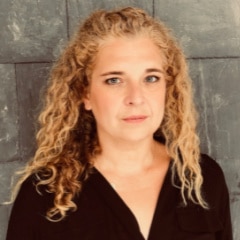
Mrs. Batson and Mrs. Hicks: Race, Rights, and the Mothers’ Fight for Boston Public Schools (1953-2003)
Parents, especially mothers, have long worked to secure better educational opportunity for their children— sometimes at the expense of opportunities for other people’s children.
This project— a dual biography of Ruth Batson, the Black chairwoman of Boston’s NAACP Public School Committee, and Louise Day Hicks, a white lawyer and Boston politician— traces five decades of mother-activism by Batson and Hicks and their fellow Black and white mother-activists. I frame the story of school desegregation as the mothers’ political battle for educational opportunity and argue that the history of American education is a story of the evolving politics of motherhood.
During the 1970s, Boston became a cautionary tale of white parents’ resistance to federally mandated school desegregation via busing as widespread racial violence captured the national imagination and fueled a narrative of “white flight” that undermined the gains of the Civil Rights Movement, exaggerated the so-called perils of integration, and turned American claims of “freedom” toward “individual” interests while denying the systemic racism behind the distribution of educational opportunity in America’s schools.
Though recent scholars have challenged the Boston “busing” narrative, public memory holds fast to the story as justification for re-segregated schools in the city—and the nation.
Juxtaposing the lives of two powerful yet understudied, mother-activists, this study bridges existing scholarship on progressive and conservative school activism. Situating mothers’ work on the spectrum of feminisms and anti-feminisms and exploring the intersectional politics of race, gender, and schools, I illuminate the ways American liberalism and conservatism were—and are—in conversation and conflict over schooling.
Rachel Johnson, University of Wisconsin-Madison
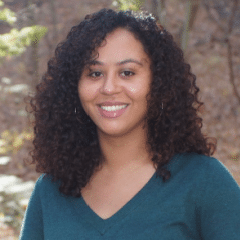
Rachel A. Johnson is a Ph.D. candidate in the department of Educational Policy Studies at the University of Wisconsin-Madison. Her dissertation research focuses on Black homeschooling families in the Midwest. She has extensive qualitative research experience, aiming to understand the various ways Black caregivers engage and advocate in schools. In a co-authored paper published in the Harvard Educational Review, she and other Black mother-scholars illuminate how Black parents’ educational decision-making involves a distinct racial calculus regarding the potential for racialized harm and numerous tradeoffs as they search for a “good” school. Rachel has served as a parent representative on several family-school engagement teams, where she advocated for shared decision-making power with Black parents and classroom practices that uplift Black students. She extended her research capacities to evaluation through training in the American Evaluation Association Graduate Education Diversity Internship (GEDI) and at Ubuntu Research and Evaluation. Rachel has co-led multiple culturally responsive evaluations such as a school-based program designed to support Black students’ academics and foster positive relationships. Her experiences as a mother, researcher, and evaluator have cultivated her interest in reimagining and enacting out-of-school educational spaces for Black people. She is continuously inspired by building community with other Black families, inside and outside of her research. She believes centering Black families in research and evaluation is necessary work for creating institutions that value them. Rachel acknowledges her work as part of a long tradition of Black peoples’ quest for education and liberation.
Homeschooling: Fugitive Education for Black Families
While the modern homeschooling movement has diversified racially, socioeconomically, and religiously since the 1990s, the homeschooling literature has yet to follow suit. The extant scholarship privileges the experiences of adult, white, middle-class, heterosexual, two-parent, Christian households, highlighting the Liberal Left and Conservative Right, while ignoring the unique concerns of Black homeschoolers. There are many studies in education that shed light on schools’ institutionalized racism and consequent harm to Black students; however, few studies examine the learning experiences of Black homeschooling families. This dissertation centers Black homeschooling caregivers and youth, and how they understand their experiences learning outside of formal public and private schools. This qualitative multi-sited study examines why Black families in Wisconsin and Illinois homeschool, how they understand their homeschooling, and how, if at all, Blackness and antiblackness shape their homeschooling motivations and experiences. This project examines the nuanced decision-making and complex factors that shape Black homeschooling families’ experiences through a variety of data collection methods: semi-structured interviews and focus groups with Black caregivers, interviews with their youth, analysis of their homeschool artifacts (e.g. journals, photos, lesson plans), and document analysis of state homeschooling laws. This study contributes to the growing body of literature on Black homeschooling by including a diverse sample of Black families, attending to understudied regions, and uplifting the insights of Black homeschool youth. This analysis of Black homeschooling families’ motivations, practices, and challenges has implications for efforts to rethink educational possibilities in and outside of schools.
Sebastián Kiguel, Northwestern University
Sebastián Kiguel is a PhD candidate at Northwestern’s School of Education and Social Policy. His research focuses on bullying, peer relations, and the social experience of schooling more broadly. His dissertation uses quantitative methods to examine how schools can reduce bullying and what this means for students’ socioemotional development and educational outcomes. He is also part of an interdisciplinary research team from Northwestern University and the Chicago Consortium for School Research working on a large research project funded by the Gates Foundation on the effect of schools on adolescents’ socioemotional development. The first paper in the project has been published in American Economic Review: Insights and another has been submitted for publication.
His work is motivated by his experiences as a teacher and a co-founder of an inclusive high school for trans youth who had been excluded from traditional education in Buenos Aires, Argentina. Sebastián holds a Masters in Public Administration from Columbia University’s School of International and Public Affairs and a Licenciate from the Universidad Torcuato Di Tella in Buenos Aires, Argentina.

How Do Schools Reduce Bullying? A Value-Added Approach
In the last two decades, bullying has garnered national attention from researchers and policymakers. A rich literature from psychology finds that bully-victimization is associated with psychological problems like depression, anxiety, and suicidal ideation, as well as educational outcomes like skipping school and dropping out. Research has helped identify profiles of students most likely to be victims, but there is little evidence on how to reduce bullying. Although every state has adopted an anti-bullying law, the prevalence of bullying remains mostly unchanged.
My research aims to address this issue by analyzing the policies and practices of schools that effectively reduce bullying. In this study, I use quantitative research methods to identify Chicago high schools that reduce bullying, quantify the effects of this reduction on students’ socioemotional development and long-term educational outcomes, and examine the school policies and practices behind these reductions. First, I use school value-added models to identify schools that systematically reduce bully-victimization relative to other schools. Second, I use this variation to explore the causal effect of attending a school that reduces bullying on measures of students’ socioemotional development, such as emotional health, academic engagement, school connectedness, and study habits, as well as long-term educational outcomes like dropouts, high school graduation, and college enrollment. Finally, to gain insight into how schools reduce bullying, I explore the policies and practices of schools that effectively reduce bullying. My research findings can be helpful for schools and districts to design plans to ameliorate bullying.
Brian Heseung Kim, University of Virginia
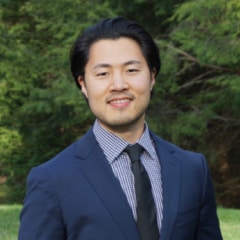
Brian Heseung Kim is a doctoral student in the University of Virginia’s Education Policy program. His primary research interests revolve around supporting students of historically underserved backgrounds through major decision-making junctures like the postsecondary application process and the post-graduation job application process. Leveraging a combination of traditional econometric methods, machine learning approaches, and natural language processing techniques, his current projects examine the potential for biases in teacher recommendation letters for postsecondary applications, the variation in virtual advising practices in a college completion nudging intervention, and the use of job recommendation algorithms to support low-income students through the post-graduation job search. In future research, Brian will continue exploring this intersection of education, data science, economics, and ethics.
Before beginning his graduate program, Brian studied education from a wide variety of perspectives: as a traditionally-certified high school teacher and teacher leader in Maine, a college counselor with Upward Bound, a tutor of elementary school students through America Reads and Counts, an instructor of economic game theory for gifted and talented students, and an admissions interviewer for Bowdoin College, where he received his B.A. in English and Economics. During his doctoral program, Brian has also served as a Research and Equity intern with the Virginia Department of Education and a Data Science Fellow with DonorsChoose. In his own time, Brian enjoys hiking, 3D printing, music production, and generally getting good-but-not-very-good at all things
What’s in a Letter? Using Natural Language Processing to Investigate the Prevalence of Linguistic Biases in Teacher Letters of Recommendation for Postsecondary Applications
While scholars have already uncovered many ways that low-income, first-generation-to-college, and racial/ethnic minority students are systematically disadvantaged across the postsecondary application portfolio – from standardized tests to advanced course-taking opportunities – we know almost nothing about whether teacher letters of recommendation advance or impede these students’ college aspirations. This blind spot is especially concerning given mounting evidence that recommendation letters in other contexts can contain biased language, that teachers can form biased perceptions of their students’ abilities, and that narrative application components more generally may contribute to racial discrimination in selective college admissions. Meanwhile, institutions continue to move away from standardized test scores — positioning recommendations to be even more prominent going forward.
In my dissertation, I will conduct the first system-wide, large-scale text analysis of teacher recommendation letters in postsecondary applications. With application and recommendation data from 2 million students, 500,000 teachers, and 400 postsecondary institutions, I will examine the prevalence of linguistic biases within these letters: whether students are described by teachers in systematically different ways across racial/ethnic, gender, and socioeconomic groups. By combining rigorous econometric frameworks with sophisticated natural language processing (NLP) techniques, I can analyze variation in letter characteristics at unprecedented scale and fidelity while accounting for salient confounding factors like student academic and extracurricular qualifications. It is paramount that we better understand the role of these letters in ameliorating or exacerbating inequity, and these analyses will provide urgent insights for college admissions practices, affirmative action litigation, and NLP methodologies for education research.
Lynton Lees, Columbia University
Lynton Lees is a Ph.D. candidate in the Department of History at Columbia University. Her research explores the political history of education, liberal democracy, and citizenship in the late British empire. Placing education within broader political, social, cultural, and imperial contexts, her work examines how education across the British world was shaped by a growing sense of democracy’s fragility and contingency in the interwar and postwar period. Her research traces the development and dissemination of new forms of education for democratic citizenship across the British world, in postwar West Germany, and in rehabilitative projects for displaced child refugees. Recovering the exclusion of Britain’s non-white imperial subjects from these blueprints for self-governance, it furthers our understanding of education’s historic relationship to race and imperialism. Her archival research was supported by the North American Conference on British Studies.
Originally from northwest England, Lynton holds an M.A. from Columbia, and a B.A. from the University of Oxford. She was a visiting student at Princeton University and Birkbeck College, University of London. In 2015, she founded the Oxford First-Generation Society, now the largest organization in the U.K. representing first-generation college students. She previously ran the Access and Outreach department at Christ Church, University of Oxford, working to remove barriers to higher education for disadvantaged young people. As a graduate student, Lynton has taught widely in modern British and modern European history. She served as the Lead Teaching Fellow responsible for graduate student teacher-training and pedagogical development in Columbia’s History department in 2019-2020.

Democracy’s Children: Education, Citizenship and the Totalitarian Challenge to the Late British Empire, 1931-1951
In the mid-1930s, as Nazi education reforms pushed the boundaries of the pedagogically permissible, leading educators across Britain’s settler empire appointed themselves guardians of liberal democracy for future generations on the world stage. This dissertation recovers for the first time how British educators crafted new models to teach children to be democratic citizens, in response to totalitarian claims upon the young. Using a qualitative, multi-archival approach, this project reconstructs the prolific network of imperial educationalists who established these new pedagogical theories and practices designed to teach children to ‘think for themselves’ and exercise self-governance, while becoming as ideologically committed to democracy as the Hitler Youth seemed to Nazism. These pedagogues then sought to export their models globally: from centers of educational research in Britain’s white settler colonies, to educational reconstruction in West Germany, and through experimental schemes with Jewish child refugees brought to Britain after 1945. By reconstructing a moment of global educational rivalry, this research advances our understanding of how ideological conflict can both generate new educational knowledge, and also expose core tensions within existing educational practice. Twentieth century-imperialists justified the project of empire as a pedagogical form of guardianship and civilizational development. Yet educators refused to extend education for democratic citizenship to imperial subjects of color, deemed unfit for self-governance on the basis of race. This project reveals how educational theory and practice functioned as a tool of exclusion, reinforcing a racist imperial hierarchy that was far from democratic.
Amalia Krystal Lira, Michigan State University

Amalia (Krystal) Lira is a Ph.D. candidate in the Educational Psychology and Educational Technology program in the Department of Counseling, Educational Psychology and Special Education at Michigan State University. She is interested in broadening participation of diverse communities in the STEM workforce. She draws from theories of identity, critical race theory, and motivation theories to inform how to support diverse students in the STEM pipeline. Her dissertation study explores intersectionality among Black engineering students and the gender and racial stereotype threat they may face to better understand engineering persistence using explanatory mixed methods.
At Michigan State University, Krystal worked as a research assistant on an NIH-funded longitudinal study that examined how motivation, identity, and belonging influenced persistence in Engineering majors. She also worked directly with her graduate program to addresses equity-focused issues on campus and to advocate for diverse student representation in her program. Her commitment to equity-focused research was recognized in 2019 as she was awarded the Donald H. Nickerson Fellowship in Cultural Diversity and Minority Concerns in the College of Education at Michigan State University. She also currently serves as a graduate student committee member of the Race and Diversity Ad Hoc Committee for the American Psychological Association (Division 15). She is a first-generation, Latinx female scholar from Los Angeles, California and received her B.A. in Psychology from California State University, Long Beach.
Complex Cultural Identities and Stereotype Threat in Engineering: An Integrative Mixed-Methods Study
Individuals from traditionally minoritized groups, such as Black, Latinx, and Native American men and women, continue to be underrepresented in engineering careers. A growing body of research in educational psychology points to the particular importance of examining identity processes in educational settings, especially those situated in racialized and gendered experiences. Given that identity development is impacted by social-cultural and contextual factors, it is also important to consider how perceptions about one’s environment can lead students to develop adaptive or maladaptive beliefs about “who they are.” As such, examining stereotype threat—the anxiety related to being judged stereotypically and conforming to the stereotypes—in combination with multiple identities, may be important for understanding how to increase engineering achievement and persistence.
This multitheoretical and mixed methods study will examine complex identities and stereotype threat on engineering persistence and achievement. Using an explanatory sequential design, the quantitative survey data analysis will be used to inform the qualitative data collection. A latent profile analysis, using the structural equation modeling framework, will be employed to examine the unique profiles of individuals in varying identity and stereotype threat profiles. Further, a sub-sample of the same students will be interviewed to gain an in-depth understanding of their experiences in engineering. This dissertation has the potential to advance theoretical and practical knowledge of engineering persistence by using culturally relevant and asset-based theories and methods and by providing recommendations for structural supports that may benefit diverse students.
Amanda Lu, Stanford University
Amanda Lu is a Ph.D. Candidate at the Stanford Graduate School of Education studying Education Policy and the Sociology of Education. She is an IES Fellow and a recipient of the Stanford Graduate Fellowship in Science and Engineering. After working for four years as a math teacher and college counselor in Post-Katrina New Orleans at Edna Karr High School, Amanda pursued graduate study to make sense of the charter reforms affecting her students and their families. Her research agenda seeks to understand how new organizations arise as a result of market-based education policies and assess the broader implications of the privatization of public goods for marginalized communities. She plans to employ qualitative, quantitative, and computational methods from multiple disciplinary perspectives to challenge the simplicity of market reform rhetoric and document how school choice policies affect access to educational opportunity and political voice for urban communities of color.
Amanda holds a B.A. in Government and African Studies from Harvard College, as well as an M.A. in Education Policy Organization and Leadership Studies (POLS), an M.A. in Sociology, and a Masters in Public Policy from Stanford. She has remained heavily involved in the POLS program as an instructor and has supported graduate and undergraduate level public policy courses. In her spare time, she enjoys hiking that maximizes views and minimizes uphill climbs, road trips with great playlists, and cooking overwhelming amounts of food for her friends and family.
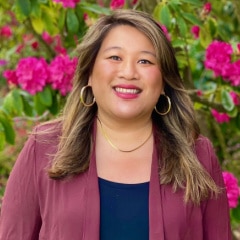
New Markets, Old Scripts: The Meaning of the Post-Katrina New Orleans Charter School Market for Urban School Reform and Marginalized Communities
Though much has been written about the features and impact of New Orleans Charter reforms, we know little about the actual processes that led the initial state takeover to become the nation’s first all-charter school district experienced by students and families today. This dissertation explores how this reorganization took place in the wake of Hurricane Katrina. In doing so, I show how organizational actors in the new regime established themselves and cemented their power within the newly-created system. My dissertation takes a longitudinal approach by examining the organization-level decisions and strategies which implemented and sustained reforms at three distinct time periods: the initial decision to pursue large-scale charter reform immediately following Hurricane Katrina, the construction of the early charter school market, and the subsequent consolidation of that market into a small number of reform-oriented charter networks. Within each of these periods, I pay particular attention to how local communities of color reorganized and responded to these reforms and how new organizational structures like charter school networks and social ventures emerged, persisted, or failed.
Nikki McDaid, Northwestern University
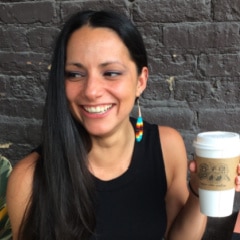
Nikki McDaid (Shoshone-Bannock, Paiute) is a doctoral candidate in the Learning Sciences at Northwestern University. Her research interests are broadly focused on informal and formal learning environments at the intersection of land-based education and Indigenous resurgence. More specifically, she wants to understand the ways that Indigenous youth in a land-based learning environment (Dr. Megan Bang’s ISTEAM program) recognize the personhood of plants and more-than-human animals and whether or not the propensity to do so might have an effect on the ways youth engage in decision-making around social and environmental concerns. She is also conducting research on how Indigenous and non-Indigenous people who have lived in the midwestern US for generations conceptualize their closeness with nature and define environmental problems. Nikki earned her M.A. in Teaching from Pacific University and her B.S. in Sociology from Northeastern University. She also is a parent of two young children and a former middle school and high school teacher.
Indigenous Knowledge Systems Informing STEM Education toward Equitable and Sustainable Ecological Decision-making
Given rapidly changing climates, it is crucial that educational systems begin supporting youths’ capacity to make sustainable decisions. Current research indicates that knowledge about climate change is not sufficient to shift human environmental behaviors. My mixed methods dissertation offers theoretical and practical contributions around culturally-responsive, action-oriented STEM education that builds relations between learners and the nature they live in as a climate change mitigation strategy.
Study 1 is situated in a STEAM summer program for urban Indigenous youth. Analyzing video and interview data, I ask: how does the program pedagogy support or enclose (see Richardson, 2011) caring relationships between humans and plants? What values, beliefs, and knowledge do participants develop through their interactions with plants over time?
Study 2 is a cognitive psychological study, which asks: how do ecological self-construals (independent or interdependent) vary between and within Indigenous and non-Indigenous populations in the Midwestern US? What is the relationship between ecological self-construals and knowledge systems that people access when making environmental decisions and how does this vary by participant group?
To explore these questions I will conduct a survey about closeness to nature and conceptions of environmental problems. Together, these studies have the potential to uncover better ways to teach about climate change and help youth develop relations with lands and waters that lead to brighter climate futures. Considering the climate crisis before us, it is critical we design learning environments that prepare our children and communities to build sustainable and equitable futures.
Greer Mellon, Columbia University
Greer Mellon is a Ph.D. candidate in Sociology at Columbia University. Her research uses quantitative methods to examine how variation in school district leadership contributes to educational inequalities in the United States. Greer built a longitudinal database of school district superintendent employment tenures in 26 states to estimate variation in “superintendent effects” on academic achievement. Her dissertation research examines how school boards and superintendents balance policy-making power, and how differences in the political, racial/ethnic, and occupational composition of local school boards contribute to differences in local educational policymaking. Her research utilizes a novel data source: longitudinal “roll-call” policy vote records from school board meeting minutes from a sample of 150 school districts in California, Florida, and New York.
Greer’s other research projects include examining explanations for college major choice among students attending less-selective four-year colleges, and assessing trends in the gender gap in early elementary school achievement.
Before beginning her Ph.D., Greer worked in nonprofit and government research. She was the Director of Evaluation and Development at the Digital Harbor Foundation in Baltimore, MD. She also worked as a Research Analyst at Legal Services Corporation in Washington, DC, and as a Political Market Research Analyst at Benenson Strategy Group. Greer received an MPhil in Development Studies (International Development) from the University of Oxford, where she was the recipient of a Euretta J. Kellett Fellowship. She also has an M.A. in Statistics from Columbia University, and a B.A. in History from Columbia University.

Local Control and Educational Inequality: A Longitudinal Empirical Study of School District Governance in the United States
In the United States, school districts are places where consequential educational policy decisions – from school zoning to local funding initiatives– are contested and implemented. Despite their importance, we know relatively little about how policy decisions are made at the school district level, and in particular, what role school district officials – superintendents and school board members – play in determining local educational policy outcomes. My dissertation research addresses these broader gaps by examining two specific research questions: (1) how much policy-making power does the school board exercise relative to superintendents and (2) are there important policy voting differences among board members with different racial/ethnic, partisan, and other background characteristics? In addressing these questions, I use a new dataset of all school board roll-call vote records available from 2009-2019 that I have web-scraped from a stratified sample of 150 school districts in three states (FL, NY, CA). Policy introduction and roll-call vote records are matched to demographic data on district officials from voter files. This data source provides the first opportunity—to my knowledge—to directly observe school board officials’ policy-making behaviors longitudinally and to draw generalizable conclusions about the relationship between the characteristics of school district officials and the actions they take to support different policy outcomes. The goal of my dissertation is to further our understanding of the dynamics of an educational organization that sets policies that have implications for student achievement and educational equity.
Michael Mena, City University of New York Graduate Center

Mike Mena is a Ph.D. candidate in Linguistic Anthropology at the Graduate Center (NY) and focuses on how ideologies of race and language converge in ways that reproduce hierarchical arrangements and income inequality. His ethnographic research focuses on the neoliberalization of higher education at a self-purported “bilingual” university in Texas. Mike Mena is also an educational technologist and media-making consultant for educators. He specializes in creating public-facing, open-access video resources within the disciplines of Critical Race Theory, sociolinguistics, and linguistic anthropology In 2019, Mena’s YouTube channel, The Social Life of Language, was recognized with the Society for Linguistic Anthropology’s “Public Outreach and Community Service Award.” The Social Life of Language continues to receive national and international recognition for its multi-modal pedagogical approach and as intellectually informed public activism.
An American University in a Neoliberal World: The Making of a “Bilingual” Hispanic-Serving Institution
The University of Texas Rio Grande Valley (UTRGV) opened its doors on August 31, 2015 as a “bilingual, bicultural, and biliterate” campus—the only one of its kind in the United States. This is a categorical achievement in the near 200 year-long quest for the educational advancement of Latinxs in Texas, who have been historically subjugated by state-sponsored violence, segregation, and political and economic disenfranchisement (Montejano, 1987; González, 1999, 2013; Blanton, 2004). This project focuses on one university located on the U.S.-Mexico border where English-Spanish bilingualism is afforded a recognition based on its potential economic value—as a commodifiable “skill”—while simultaneously downplaying, veiling, and/or erasing the historical political struggle against the racialization of Latinxs in the United States. Scholars note that marked difference, particularly with historically racialized groups (including Mexicans, Mexican Americans, Latinxs, etc.), is often produced such that institutional participation is deemed valuable so long as minoritized groups look and behave a certain way—that is, present as non-threatening to the political and economic status quo (Ahmed, 2012; Dávila, 2001). This ethnographic research focuses on the ongoing conceptual re-articulation of language and bilingualism, which in turn interacts with processes of racialization and neoliberal governance in an effort to better formulate practical responses to social inequality in higher education policy and instruction.
Pablo Montes, University of Texas
Pablo Montes is a descendant of the Chichimeca Guamares and P’urépecha people from the valley of Huatzindeo, specifically from a small rancho called La Luz at the foot of the Culiacán mountain. They are a proud child of formally undocumented parents and are a first-generation student. They currently reside in Tza Wan Pupako (Austin, TX) and are a Ph.D. Candidate in the Cultural Studies in Education program at the University of Texas at Austin in the Department of Curriculum and Instruction. Their main research interests are at the intersection of queer settler colonialism, indigeneity, and Land education. Their dissertation project emphasis the transformational learning spaces that Two-Spirit and Queer Indigenous educators create. Additionally, they consider how Queer educational discourses often leave settler colonialism unattended and argues for a nuanced critique of Queer theory in pedagogy, curriculum, and learning.
Alongside graduate school, they are the Youth Director for the Indigenous Cultures Institute (ICI) in San Marcos, TX, led by the Miakan-Garza Band of Texas elders, Dr. Mario Garza and Maria Rocha. In fact, it is through this opportunity that they were able to witness how Two-Spirit and Queer Indigenous educators transform learning during the annual ICI summer encounter – a week-long ceremonial and educational experience for Indigenous youth. Lastly, Pablo holds a B.S. in Sociology and Human Development and Family Studies from the University of Wisconsin – Madison, where they were also a McNair Scholar and an M.A. in Cultural Studies in Education from the University of Texas at Austin.
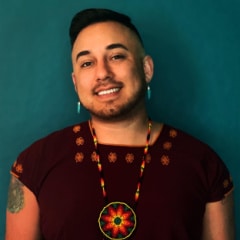
(Re)Storying Queer Land Education: Pedagogical Hub-Making of Two-Spirit/Queer Indigenous Educators
This collaborative project is a culmination of stories, memories, testimonios, dreams, life histories, and Two-Spirit and Queer Indigenous educators’ experiences. I spend a year with 2S/Queer Indigenous educators to engage with what Opaskwayak Cree Nation Two-Spirit scholar Alex Wilson poses as Queer(ing) Land Education. Queer(ing) Land Education disrupts the gender-based essentialisms ubiquitous within environmental and nature educational discourses by attending to non-binary approaches of human and more-than-human worlds and Indigenous gender and sexual diversity within pedagogy, curriculum, and educational praxis. The project is both ethnographic and autoethnographic as Indigenous paradigms in education argue that Indigenous researchers cannot be disentangled from the community since that would be severing already formed relationships imperative to Indigenous knowledges and ways of being. I host five community circle gatherings, attend ceremonies, and engage in inter-reflexive work throughout one year to focus on how Two-Spirit and Queer Indigenous educators create pedagogical and curricular hubs guided by their relationship to their Indigenous communities, ancestors, and Land. I deploy Land education (Tuck, McKenzie, & McCoy, 2014) as a theoretical guide and the hub (Ramirez, 2007) as an organizational theory to make sense of Two-Spirit and Queer Indigenous educators’ learning-building capacities. The following questions will guide this work to foreground a Queer Land Education: How are Two-Spirit and Queer Indigenous educators (re)storying their Land relations by creating queer Indigenous hubs that center Land-based pedagogies and curriculum? How does centering Two-Spirit and Queer Indigenous educator voices provide avenues to re-imagine curriculum building, gender fluidity, and community epistemologies?
Nozomi Nakajima, Harvard University
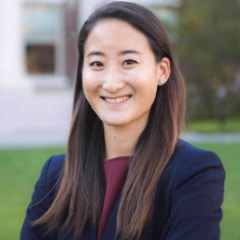
Nozomi Nakajima is a Ph.D. candidate in Education Policy and Program Evaluation at Harvard University. Her research focuses on how families, schools, and policymakers make educational decisions, as well as the consequences of these decisions on economic and social inequality. In her research, Nozomi combines existing administrative data with new surveys collected in partnership with government and non-profit organizations. By cultivating research-practice partnerships, Nozomi aims to improve the use of research evidence in education.
Prior to her doctoral studies, Nozomi worked on research and operational projects at the World Bank. Nozomi holds a B.A. in Political Science from Yale University, M.A. in Education from Stanford University, and A.M. in Statistics from Harvard University. Nozomi was born and raised in Kobe, Japan.
Evidence-Based Decisions and Education Policymakers
Decisions made by education policymakers determine how schools and teachers are organized, and how students learn. In today’s era of evidence-based policymaking, education policymakers face pressure to use research to inform their decisions. This project explores the mental models that policymakers use when integrating research evidence in their policy decisions, with a focus on education policymakers working in state and local education agencies in the United States. First, I examine policymakers’ preferences for research evidence. Using a discrete choice experiment, I present policymakers with a series of research studies that vary along attributes of internal and external validity. Policymakers are asked about their preference between pairs of research studies as they make a hypothetical policy decision, requiring them to make trade-offs between different study attributes. Second, I explore what policymakers believe, what information they seek out, and how they update their beliefs about the effectiveness of education policies. To do so, I elicit policymakers’ predictions for the effect of an education policy in a particular setting. Then, I conduct an information experiment to study how policymakers update their beliefs in response to information from researchers and from peers. I test whether the updating process is consistent with a model of rational learning. Together, the results of this study will help us better understand how education policymakers make evidence-based decisions.
Kevin Pelaez, San Diego State University
Kevin Pelaez is a doctoral candidate in the Mathematics and Science Education joint doctoral program at San Diego State University and University of California, San Diego. Kevin’s dissertation is at the intersection of statistics and data science education, teacher education, and critical pedagogies. Particularly, Kevin is using design-based research to develop and study a data science class for prospective mathematics teachers that aims to develop statistical and critical literacies in preparation for teaching data science. For the past three years, he has also worked on an NSF-funded project focused on designing secondary mathematics classrooms that create opportunities for all students, especially multilingual students, to learn mathematics.
Prior to his doctoral studies, Kevin taught mathematics at the high school and college level as well as high school AVID and statistics. He received an M.S. in Statistics from San Diego State University and a B.A. in Mathematics with an Applied Emphasis from the University of San Diego. As a local San Diegan, Kevin continues to enjoy working with families, schools, and communities where he grew up. When he’s not coding (either in MaxQDA or R Studio), Kevin spends time attending to his collection of plants that grew while in quarantine. His favorite plant genus is monstera and his favorite species is the monstera adansonii.
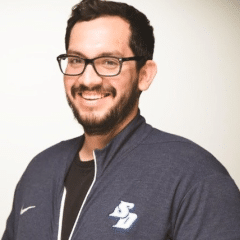
Reading and Writing the World with Data: Teaching Statistics and Data Science for Social Justice to Pre-Service Math Teachers
The widespread availability of data and the emerging field of data science has focused attention on how we prepare teachers to teach statistics. It is particularly important that teacher preparation programs provide preservice mathematics teachers (PSMTs) opportunities to learn about data science as well as how data can be used to identify, analyze, and challenge social injustices. In my dissertation, I use a teaching statistics for social justice (TSSJ) frameworks approach to develop a teaching experiment for PSMTs that aims to develop (a) traditional statistical content knowledge, (b) statistical practices, and (c) understandings of race, racism, and educational equity in the context of statistics. Data includes surveys, task-based interviews, and classroom data (e.g., observations, student journals, classwork). Quantitative and qualitative findings from this dissertation will inform the design of statistics and data science curriculum for teacher preparation programs, design principles for teaching race and racism in the context of statistics and data science, and will contribute to theories of statistical knowledge for teaching. More broadly, the goal of this dissertation is to help prepare the next generation of statistically and critically literate teachers that can read the world with data (learn about social inequities through data) and write the world with data (engage in actions with data that challenge inequities).
Rachel Perera, Pardee RAND Graduate School
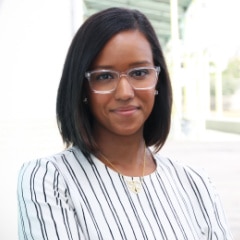
Rachel M. Perera is a Ph.D. candidate in Policy Analysis at the Pardee RAND Graduate School and an assistant policy researcher at the RAND Corporation. Her research uses quantitative policy analysis and applied econometrics to examine racial/ethnic and socioeconomic inequalities in education and assess the effectiveness of policies and programs designed to reduce inequality. Her dissertation work examines how federal civil rights enforcement through the U.S. Department of Education’s Office for Civil Rights is used to remedy racial discrimination in school discipline. In addition to her dissertation, Rachel’s current research focuses on school discipline disparities, principals’ racial attitudes, and student assignment and school choice policies.
Prior to joining Pardee RAND, she spent five years with Teach For America, most recently serving as director of research partnerships. She has an M.P.A. from the Robert F. Wagner School of Public Service at New York University and a B.A. in History and Political Science from Hofstra University.
A Promise Unfulfilled? How Modern Federal Civil Rights Enforcement is Used to Address Racial Discrimination in School Discipline
Despite decades of literature highlighting stark racial disparities in exclusionary discipline and a flurry of recent policy efforts aimed at narrowing gaps, racial disparities in discipline remain. Researchers hypothesize that prior approaches have been ineffective in narrowing gaps because of an inattention to the role of racism and discrimination in the discipline process. One understudied policy tool that targets racial disparities and centers concerns of racial discrimination in school discipline is the use of federal enforcement of anti-discrimination laws through the U.S. Department of Education’s Office for Civil Rights (OCR).
In this study, I provide the first systematic evidence on how OCR’s civil rights enforcement is used to address racial discrimination complaints related to school discipline. To do so, I use a newly obtained dataset combining information on all OCR complaints of racial discrimination in school discipline between 1999 and 2019 with a number of existing public data sources. I first analyze trends in the incidence of complaints and investigations and examine what observable district characteristics predict various types of OCR activity and outcomes. Next, I use a difference-in-difference design that relies on variation in the timing of OCR investigations to estimate the causal effect of OCR initiating a civil rights investigation in a school district on discipline rates, racial discipline gaps, and racial test score gaps. This project will enhance our understanding as to how this mechanism of federal oversight is operating in practice and provide the first quasi-experimental evidence on the effect of federal investigations on student outcomes.
Allison Raven, Duke University
Allison Raven is a Ph.D. Candidate in History at Duke University. Her research examines the end of school desegregation as an active public policy choice, rather than an inevitable outcome. As a historian of the twentieth century United States, Allison’s work bridges the social and cultural histories of the civil rights movement with education policy scholarship, demonstrating the political and spatial considerations of ending school integration programs. Prior to beginning her graduate studies, Allison earned a B.A. in History from Rice University and worked as a middle school teacher in Houston, Texas. During her graduate studies, she has received support from and worked in partnership with Duke’s Center for Documentary Studies, the SNCC Legacy Project, Teaching for Change, Learning for Justice, the Kenan Institute for Ethics, and the Tobin Project.
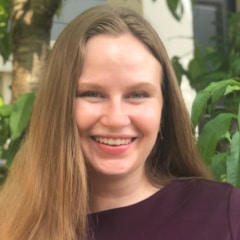
Separate but Equitable: Race, Liberalism and Abandoning Desegregation in Austin, Texas
In 1954, the Supreme Court ruled in Brown v. Board of Education that segregated schools were inherently unequal and detrimental to students. Just three decades later, school boards and communities across the United States ended desegregation programs and returned to largely segregated schools, claiming that these schools would be more equitable than integration programs. Integration’s disappearance from the definition of educational equity was a policy choice embraced by communities across the political spectrum. I explore that choice and its consequences by looking at how resegregation reshaped Austin, Texas. Austinites altered their definition of educational equity to make segregated schools compliant with the city’s ideals of progressivism. Combining histories of the civil rights movement with public policy scholarship, my project analyzes not only how schools once again came to be segregated, but how that new segregation became normalized in American society.
My dissertation makes three interventions across the disciplines of history and public policy. First, I emphasize contingency, demonstrating that school desegregation ended as Austin school officials actively sought new definitions of educational equity. Next, I intervene in the public policy discussion of “educational equity,” which generally does not consider education as a component of educational equity. I demonstrate that excluding racial segregation from the definition of educational equity was an active process during the 1970s and 1980s that required buy-in from people of color as well as white Austinites. Finally, I intervene historically by shifting the time frame of educational desegregation history forward from Brown implementation and into the 1980s.
Celia Reddick, Harvard University
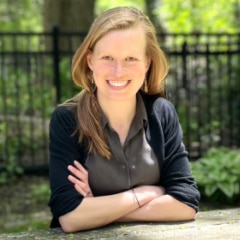
Celia Reddick is a Ph.D. Candidate in Education (Cultures, Institutions, and Society) at Harvard University. Through a comparative case study research design, Celia examines the ways that language-in-education policies and practices at school shape refugee families’ experiences of exile and their aspirations for the future. Drawing on field work conducted in Uganda, Celia integrates national and global policy analysis related to language and refugee education, ethnographic school-based observations, and interviews with refugee families, educators, and policymakers to understand the implications of language-in-education for refugee families’ present- and future-building.
Celia’s research is informed by her experience as a teacher and teacher-educator. Prior to beginning doctoral work, Celia was a high school English teacher to newcomer students in New York City. Thereafter, she worked with teachers in Uganda and with clinicians and educators in Rwanda, collaborative work that continues to inform her approach to research and teaching. She also designed and teaches the graduate course Language and History at School: Colonialism and Neocolonialism in Education Development in Africa at the Harvard Graduate School of Education (HGSE), was an Editor and Co-Chair of the Harvard Educational Review (2016-2018) and is an affiliate of HGSE’s Refugee REACH. Her research can be found in the Comparative Education Review and the Journal on Education in Emergencies. Celia holds an M.Ed. in International Education Policy from HGSE, an M.Sc. in Teaching English to Speakers of Other Languages (TESOL) from Lehman College, and a B.A. in the College of Letters and German Studies from Wesleyan University.
Language for an Unknowable Future: How Language Shapes the Lives of Refugee Children
Millions of children globally are displaced from their homes and face the challenge of attending school in languages they don’t understand. Despite this crisis, there is little research about the implications of linguistic displacement for growing populations of refugee children seeking education. My dissertation addresses this critical gap, examining how language-in-education policies—and particularly those privileging English—influence refugee children’s relationships to school, self, and home, and the ways their experiences of language at school may differ from those imagined by education policymakers. As a comparative case study conducted in Kampala, Uganda, my dissertation integrates three primary sources of data: 1) ethnographic observations across schools and NGO/government convenings; 2) analysis of global and national policies related to refugee education; 3) semi-structured interviews with Sudanese and South Sudanese refugee families, Ugandan teachers working in integrated schools, and policymakers intervening in refugee education. Preliminary findings reveal tensions related to language and refugee status: refugee children are expected to put aside home languages and achieve membership in exile through English, the language of power in the region. In response, families seek opportunity through linguistic assimilation, often at the expense of languages and cultural knowledge that are central to relationships with family left behind and aspirations for return. But emerging findings also reveal practices that can mitigate the profound loss of language, culture, and home that refugee families face while still enabling opportunity in exile, with lasting implications for research and policy to support some of the world’s most vulnerable learners.
Caterina Scalvedi, University of Illinois-Chicago
Caterina Scalvedi is a doctoral student in History at the University of Illinois, Chicago. Born and raised in Rome, Italy, she earned both her B.A. and M.A. in Early Modern and Contemporary History at the University of Rome La Sapienza. Her research bridges the global history of education with the history of fascism, colonialism, nation-state and empire formation. She is also interested in historians’ freedom of expression, teaching, and research world-wide. In 2018, she was awarded the Association for the Study of Modern Italy Postgraduate Prize for an essay on the history of Catholic missionary schools in Italian Somalia, a section of which became a book chapter on education and labor policies in colonial context. In 2020, she was an invited doctoral student at the University of Paris Descartes. She is currently publishing an essay on the production of teaching materials for colonial subjects in Northeastern Africa in the 1930s.
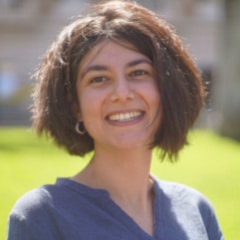
Colonial Education in Fascist Italy’s Empire: Ideologies, Policy, Lived Experiences (1922-1943)
Education was key to fascism’s political project. Under Benito Mussolini’s Italy (1922-1943), public school curricula were to turn children into fascists and thus generate a new fascist civilization in Europe. As colonial expansion proceeded, a dilemma arose: was the new fascist civilization to include youth in Africa and the Mediterranean as well? Drawing from archival and printed sources, my dissertation explores the intellectual and social history of education in fascist Italy’s colonies of Eritrea, Somalia, Libya, and the Greek Dodecanese Islands. I argue that, while fascist authorities experimented with different education policies across the empire, lawyers, pedagogues, missionaries, and schoolteachers became increasingly engaged in the global, lively discussion around “native education.” Only in 1936, I show, did the Italian state embrace a centralized education policy, grounded in eugenic theories to claim scientific legitimacy, self-fashion a modern identity, and impose Italy’s national and imperial sovereignty. Three case studies zoom in on local actors’ experiences at colonial schools—the negotiations on curricula between Catholic missionary teachers and Muslim students in Somalia (1); the schooling of African-Italian children in Somalia and Eritrea (2) and of Jews in Libya and the Dodecanese Islands (3)—suggesting that top-down definitions of Italian nation, race, and citizenship collided with localized and long-lasting practices of education. This first colonial history of fascist education questions univocal understandings of “fascist” vis-à-vis “liberal” education and enriches the study of colonial education by uncovering its local agencies and connections to nationalizing school projects in Europe.
Daniel Shephard, Teachers College, Columbia University
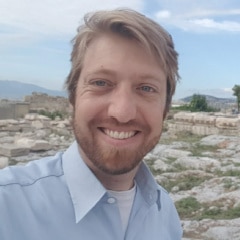
Daniel Shephard is a Ph.D. candidate in Comparative and International Education with a specialization in Sociology at Teachers College, Columbia University. His current research focuses on how school structures and social networks influence students’ social and academic trajectories within contexts of large-scale forced displacement. His dissertation will investigate how the structures of schools hosting refugee students shape interpersonal networks and how those structures and networks influence academic outcomes and social cohesion among both local and displaced students in Jordan.
Daniel has experience working on dozens of educational research projects using qualitative and quantitative methods. He collaborated on a multi-year qualitative investigation of teacher and learner well-being in the context of accelerated education programs for displaced students in Uganda and South Sudan; a qualitative study of learners’ experiences of vocational training and apprenticeship programs in Nigeria; a randomized controlled trial (RCT) of a psychosocial intervention with refugee and local learners in a basic numeracy and literacy program in Lebanon; and educational research in China, Rwanda, Tajikistan, the United States, Yemen, and other countries. He has published in Educational Researcher, Child and Youth Services Review, International Journal of Social Welfare, Global Social Welfare, Governance, the Journal of Multidisciplinary Evaluation, and has an accepted paper at the Journal on Education in Emergencies. In addition to his research experience, Daniel spent three years as a teacher. He holds a Master of Science in Evidence-Based Social Intervention from the University of Oxford and a BA from Gordon College.
Social Networks and Schooling Outcomes among Refugees and Host Students
More than 12 million refugee children have been forced to leave their homes and disrupt their education as they seek refuge in new and sometimes hostile places. In order to provide these children with an education, the United Nations High Commissioner for Refugees (UNHCR) and its partners have promoted a policy of including refugees in public schools since 2012. This goal of inclusion within the public-school system manifests itself in distinct institutional structures, sometimes involving separate schools, shifts, or classrooms for refugee students. Little is known about the individual and social effects of these institutional structures on students from both the refugee and the host communities. Jordan provides a unique case to investigate this phenomenon because over 130,000 refugees attend public schools in different institutional settings, including integrated, double-shift, and camp-based schools. During a full academic semester, this longitudinal study will combine in-depth qualitative observations and a 3-wave sociometric survey to explore how institutional forms of refugee student inclusion affect the social and academic trajectories of both refugee and host-community students. The findings of this study will contribute to the literature on social cohesion, education in emergencies, and social network formation during early adolescence.
Lena Shi, Harvard University
Lena Shi is a doctoral candidate in Education Policy and Program Evaluation at Harvard University. Her research focuses on identifying contributors to and solutions for higher education inequality. Lena’s work primarily relies on quasi-experimental approaches and randomized control trials in partnership with colleges and governments. Before starting her Ph.D., Lena worked as a Presidential Management Fellow at the U.S. Department of Education and Policy Advisor at the White House, where she helped coordinate the design and implementation of higher education policies including the College Scorecard, free community college, the earlier FAFSA, and student debt repayment plans. Lena graduated from the University of Virginia with an M.P.P. and B.A. in Global Development Studies.
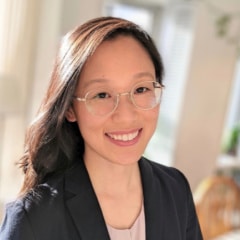
Supporting Students’ College Pathways and College Completion
Earning a college degree is increasingly important, but college quality varies substantially. My dissertation focuses on identifying and developing strategies that policymakers and colleges can implement in admissions and classrooms to improve student outcomes. The first chapter evaluates the impact of transparent transfer admissions standards on community college graduates’ transfer and completion rates using triple-differences and regression discontinuity designs. Leveraging variation in the timing and eligibility from a recent Virginia admissions policy, I find that reducing uncertainty about a college acceptance increases high-GPA students’ transfer rates to more selective flagships, raises the probability of earning a bachelor’s degree, and decreases student debt. Follow-up work will identify the role of clear admissions information relative to other factors that influence transfer choices. In chapter two, I estimate the effect of having more effective faculty, which students commonly identify as the most important factor for their learning and growth in higher education, on students’ course and college outcomes. This paper begins by estimating faculty quality in developmental education and first-year courses, and then identifies the training and employment characteristics associated with faculty effectiveness. For my final chapter, we design and randomly offer Virginia college instructors an implicit bias training program that raises faculty’s awareness about widening gaps in student performance and offers evidence-based strategies for preventing biased behavior in teaching, grading, and communications. We evaluate this program’s effects on faculty behavior, student perceptions of faculty, and student academic progress.
Gareth Smail, University of Pennsylvania

Gareth Smail is a Ph.D. candidate in Educational Linguistics at the University of Pennsylvania’s Graduate School of Education. His research brings together linguistic anthropology, sociolinguistics, and education to explore the intersection of discourse, identity, and language learning. Empirically, his research examines the social practices around language learning as a window into the changing nature of class and identity politics in the Middle East and North Africa. His current project, which focuses on the various ways in which multilingualism has been defined, valued, and pursued in Morocco, has been funded by the Fulbright-Hays Doctoral Dissertation Research Abroad Fellowship and the American Institute for Maghrib Studies Academic-Year Fellowship.
Prior to his doctoral studies, Gareth worked for six years in the international development sector. As a Peace Corp Volunteer in Morocco, he served for two years as an educator in the village of Moulay Bouazza in the Middle Atlas region. He then worked as a project manager and consultant on various international development projects funded by USAID and the World Bank. Gareth also spent a year in Algeria researching language education with the Centre d’études maghrébines en Algérie. He holds an M.A. in Arab Studies from Georgetown University and B.A. in International Studies from American University.
Reconciling Multilingualisms: Teacher Identity and Language Diversity in Moroccan Public Schools
Honoring linguistic diversity in education has become an increasingly globalized norm. Both academic scholarship and multilateral institutions such as the U.N. have come to promote educational approaches that build on students’ linguistic backgrounds as an effective and empowering alternative to schooling in a single language. In Morocco, new policies to embrace linguistic diversity in education have reversed the country’s post-independence emphasis on Standard Arabic. This has entailed officializing Morocco’s long-marginalized Tamazight language, as well as incorporating more avenues for so-called international languages like French and English. Nonetheless, Morocco’s new multilingualism has largely retained an emphasis on standardized varieties of these languages that are significantly different from the vernacular Arabic and Tamazight that schoolchildren speak at home.
Through a linguistic ethnography conducted in Morocco’s Middle Atlas region, this dissertation explores the dilemmas Moroccan teachers face as they enact this new state multilingualism. It focuses on a group of teachers tasked with introducing a new ‘creative’ language arts program in a community with its own longstanding vernacular bilingualism. It analyzes how the teachers—as simultaneously community members, agents of the state, and aspirants to a global class of professional educators—document and describe their own multilingual pedagogical practices as they attempt to establish legitimacy for their novel project. In doing so, it contributes to ongoing conceptualizations of language diversity in education as inextricable from the politics of identity.
Erica Sterling, Harvard University
Erica Sterling is a Ph.D. candidate in the History Department at Harvard University. Her research focuses on the history of education law and policy, and twentieth-century U.S. urban and philanthropic history. Her dissertation traces the evolution of federal school choice policies, illustrating how philanthropists, federal bureaucrats, and community organizers sought to reform K-12 public schools in the midst of Cold War-fueled education research and development. At Harvard, Erica is a Presidential Scholar and has worked as a teaching fellow for numerous courses on the history of race and American politics. Her work has been supported by the Andrew W. Mellon Foundation, the Lyndon Johnson Presidential Library, the Warren Center for Studies in American History, and more. Erica holds a B.A. in History and Psychology from Emory University.
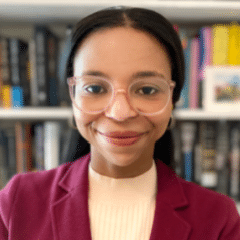
Strange Bedfellows: Race, Rights, and the Privatization of Education Reform, 1954 to 1994
My dissertation asks, how did race, philanthropy, and education law and policy intersect to produce uneven outcomes for American school children? From 1954 to 1994, the dissertation evaluates: 1) the long history of charter school policies; 2) the consequences of philanthropy’s influence; 3) and the ways in which the same reform structures could be used for very different ends, thus explaining how odd coalitions—black communities, lawmakers, and philanthropists—in support of reform ultimately emerged. The dissertation makes two contributions to existing scholarship: First, it reveals how the combined forces of the civil rights movement and the Cold War propelled an enduring shift in how federal bureaucrats, philanthropists, and education researchers tinkered with reforms for urban schools left relatively untouched by desegregation. In doing so, the project intervenes in the history of education by establishing the origins of the charter school movement and school choice among federal actors in the 1960s. Second, the dissertation pinpoints philanthropy as an important yet under-examined actor in civil rights, legal, and education histories, arguing philanthropy’s autonomy and deep pockets—before the turn of the twenty-first century—made experimentation possible. Relying on extensive archival research, this study recovers a more nuanced narrative of desegregation politics beyond the south; the ideological antecedents to charter schools rose to prominence as a solution to education inequity in urban locales, charting the course of K-12 schooling for decades to come.
Zachary Tobin, Arizona State University

Zachary Tobin is a Ph.D. candidate in Economics at Arizona State University. His research interests lie broadly in the field of labor economics, with a particular focus on the role that educational experiences play in determining labor market outcomes. His interest in education is influenced by interactions he had with students he tutored at both the elementary and post-secondary levels during his undergraduate studies. His dissertation focuses on how public schools respond to competition from charter schools, and the role of policy in shaping how school competition impacts student outcomes in both public and charter schools. Some of his other current projects focus on racial and gender disparities in post-secondary enrollment, as well as determinants of the gender wage gap among college graduates. Prior to his doctoral studies, Zachary earned an M.A. in Economics from the University of Texas at Austin, and a B.B.A. in Economics from the University of Miami, where he also earned minors in Mathematics, Finance, and Music.
Competition in the Non-Profit Sector: Evidence from a Charter School Expansion in North Carolina
The number of schooling options available outside of the traditional public system has risen rapidly for American households over the past few decades, but the spillover effects of school competition on the students that remain enrolled in traditional public schools are still not well understood. While existing studies of school competition often choose to model public schools as stand-ins that do not make strategic decisions or similarly to for-profit firms, I argue that theories of competition among non-profit charities more accurately capture the incentives of public-school educators. Using data from a large-scale charter school expansion that occurred in the state of North Carolina following a policy change in 2011, I find that charter competition had a negative effect on the academic achievement of students that remained enrolled in traditional public schools, and I also provide evidence of some relevant underlying mechanisms. In particular, I find that competition is associated with an increase in the provision of consumption amenities to households that do not directly improve academic achievement. Further, I find that the negative effects of competition on test scores are even larger in situations in which traditional public schools are competing with charters managed by for-profit organizations. Overall, these results raise important questions not just about the efficacy of school choice as a tool for improving academic performance, but also about the fundamental objectives of a school.
Tatiana Velasco Rodriguez, Teachers College, Columbia University
Tatiana Velasco is a Ph.D. candidate in the Economics and Education program at Teachers College, Columbia University. Her research studies the relation between education policies and economic inequality, with a focus on higher education and the transition to the labor market. Her work centers in Latin America and leverages administrative data with policy evaluation methods. Tatiana is particularly interested in the role of financial aid policies and their impacts on segregation and student behaviors as determinants of academic success and social mobility. In her dissertation, Tatiana uses novel administrative data to build students’ social networks and study how desegregation policies can affect students’ social interactions.
Prior to her Ph.D. at Columbia, Tatiana worked as a researcher at the School of Economics at Universidad de Los Andes (Bogotá, Colombia). During this time, Tatiana studied several education policies in Colombia and participated in multiple policy evaluation projects. Her research has been published in the Journal of Research on Educational Effectiveness and in World Development. Tatiana holds a Bachelor’s degree in Political Science and a Master’s degree in Economics from Universidad de Los Andes.

Diversity and Student Social Interactions: Evidence from an Elite College and Turnstiles
The efforts to desegregate schools by helping low–income students to attend elite institutions have spread around the world. However, the evidence on how students’ social networks respond to such policies remains scant. While there is evidence indicating that school integration fosters upward mobility and more positive views towards others (Chetty al., 2020; Fryer, 2011; Rao, 2019), there is little evidence on how students’ interactions within schools respond to such policies. Importantly, there is a concern that school integration benefits may be undermined if social interactions within schools remain segregated. My dissertation provides evidence on this gap by asking: What happens to students’ social interactions when a desegregation policy forces socio-economic integration? Are low–income and wealthy students more likely to interact with one another? Moreover, if social interactions change, how does that reflect on academic achievement? To answer these questions, I study a natural experiment at an elite university that experienced a sharp and unexpected increase in its enrollment of low–income students. To measure social interactions, I assemble a novel dataset based on over a hundred million records of students’ movements across campus as recorded by turnstiles guarding all campus entrances. I derive an indicator of students’ interactions, which I validate against a social network survey. I combine these data with student-level records and implement a difference–in–differences approach that exploits the plausibly random variation in the share of low–income peers within degree programs (i.e., majors) and across cohorts.
Rachel Williams, University of California, Berkeley

Rachel Williams is a doctoral candidate in the Graduate School of Education at the University of California, Berkeley. Her research agenda explores the linkages between the political economy, segregation, education policy, and Black politics. Her dissertation utilizes qualitative and spatial methods to examine the contemporary processes that reconfigure racial injustice under new terms at the intersection of public policy domains—housing, education, and district fragmentation. Rachel examines charter growth in relationship to new modes of segregation, such as predatory housing policies and county secession, while drawing linkages to Black politics in a majority Black city in the U.S. South. Rachel received a M.P.P. in Education Policy from Vanderbilt University and a B.A. in Psychology from Dillard University. Prior to graduate studies, she worked in the public policy and advocacy department at Illinois Action for Children.
The Black Geographic: Charter Expansion and Politics in the Southern City
School choice evolved from an obstructionist tactic by white, middle-class families and policy makers determined to undermine desegregation efforts to a policy utilized by some advocates to (re)construct civil rights for Black communities (Scott, 2011; Orfield & Frankenberg, 2013). Since 1991, advocates offer charter schools as a policy lever to improve educational opportunities for Black students – with substantial federal and philanthropic support – despite mixed evidence on their effectiveness. Building on historical analyses that illuminate the ways school, housing, and city policies converged to construct racially segregated cities and suburbs in the post-World War II era (Erickson, 2016), this dissertation explores contemporary modes of segregation, such as exploitative housing policies and county secession, in relationship to charter growth in a majority Black city in the U.S. South. This case study integrates qualitative and spatial methods to examine the political, economic, and spatial dynamics shaping charter expansion in Memphis, Tennessee between 2008 and 2021. By exploring the contemporary implications of the historical relationship between Jim Crow era segregation, education policy, and unequal political and economic power, this case study illuminates the locally contingent processes that shape how charter schools take root in new places, while building knowledge on the structural conditions that shape Black politics in a majority Black U.S. Southern city. As the Southern plantation economy established the racial logics and ideological foundation that structured national institutions, this present-day analysis will illuminate continuity and change between segregation, capital, schools, and Black intra-racial politics within neoliberal political economy.
Xin Yang, Yale University
Xin (Kate) Yang is a Ph.D. candidate in Psychology at Yale University. Her research broadly focuses on social inequalities and group cognition. Over the last five years, she has conducted more than 10 research projects broadly related to education. She has studied a range of topics, including children’s evaluations and beliefs of talent versus effort, children’s developing appreciation of those who overcome internal or external constraints to achieve academic success, as well as intergroup bias, cooperation, and social inequalities and social structure. Ultimately, she hopes her work will help with reducing inequalities, combating biases, promoting cooperation, and creating a more just world. Kate holds master’s degrees in Psychology from Yale University (M.S. and M. Phil.) and bachelor’s degrees in both Psychology and Economics from Tsinghua University.
Apart from her experience in academia, Kate also has other unique experiences that prepared her for a career dedicated to promoting equity in education. She is the first person in her low-SES family to obtain a bachelor’s degree. When she was 9, her parents brought her from a poor region to a more developed part of China to seek better education, which became a life-changing experience for her. As she traveled across China, she witnessed great inequalities in the distribution of educational resources. This led her to found a volunteer association that mobilized hundreds of volunteers in her city to help students from underdeveloped regions. For example, she organized book-donations and took groups of volunteers to work with elementary schools in a poor village.
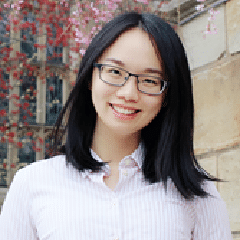
Learning and Teaching in an Unequal World: How Children Navigate Social Inequalities and What We Should Teach Them
Today’s children live against a striking backdrop of social inequalities that they will have to come to terms with as they grow into tomorrow’s adults. Given how quickly children pick up cues of inequality and how early they develop proto-political views, it is important to learn about their intuitive theories of social inequalities and prepare them to rectify inequalities and build a more equitable future world. Kate’s dissertation project builds on this foundation. She provides new insights into the development of more complex understandings of wealth, poverty, and social inequalities across ages and cultures. Using an experimental manipulation, she also shows that when children are randomly assigned to a rich social group, they develop stronger justifications for social inequalities, paving the way for future empirical and applied work. Her work also sheds light on potential educational interventions to mitigate perpetuations of inequality and stigma of poverty in future generations. Parents and educators can thus act to promote children’s understandings of social inequalities and increase their support for equality by more carefully selecting the narratives they provide children.
Sandra Zuñiga-Ruiz, University of California, Berkeley
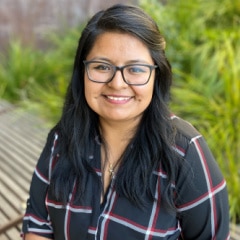
Sandra Zuñiga-Ruiz is a Ph.D. candidate in the Education in Mathematics, Science and Technology program at UC Berkeley’s Graduate School of Education. Broadly, her research agenda sits at the intersection of learning, social and racial justice, and mathematics. Sandra’s dissertation seeks to understand how prospective self-identified Mexicana maestras (educators) make sense of issues of race and social justice with and of mathematics. Such understanding comes from taking a proactive role in designing a counterspace that aims to leverage their repertoires of practice and affirm their marginalized identities as Mexicanas. Her work is deeply informed by her experiences growing up in a predominantly immigrant Mexican community, her desire to become educada in mathematics, and ultimately her commitment to support and serve the next generation of educators teaching in the barrio.
Sandra holds a B.S. in Mathematics from California State University, Monterey Bay, an M.A. in Mathematics from San Francisco State University and a second M.A. in Education from The University of California, Berkeley. At Berkeley, she received the Chancellor’s Fellowship to support her graduate work. She has had the opportunity to continue teaching at the college level both in Mathematics departments and in the Graduate School of Education at Cal. She is a proud member of the Functions and TRU labs.
Towards a Critical-Mathematical Consciousness: Understanding the Construction of a Counterspace for Prospective Maestras Mexicanas
Although there has been sociopolitical turn in mathematics education, very little is known about how prospective teachers of color come to develop racial and critical literacy of and with mathematics. Given the growing number of Latinx students and the continued marginalization of women of color in mathematics, it is imperative we center the voices and historias of Latinas but specifically Latinas who seek to become maestras (educators). My study aims at understanding how prospective self-identified Mexicana maestras make sense of issues of race and social justice with and of mathematics with an explicit attention to designing the learning environment, the counterspace. The study is grounded on the idea that affirming spaces do not come to exist on their own; if we are intentional about justice then we design towards justice. Through pláticas (deep meaningful and personal conversations), prospective maestras Mexicanas will engage in critical conversations about race, language, and justice with and of mathematics centering their lived experiences and collectively redefining mathematical activity. This study roots its inquiry in CRT and LatCrit frameworks but more specifically centers narratives, testimonios, that function as a means to understand the lived experiences of those who have been traditionally marginalized and whose experiences are erased from mathematics education scholarship. This study will contribute to the efforts of supporting prospective teachers of color, Mexicanas, on their trajectory to becoming maestras of mathematics while ultimately offering a counterspace as a form of sustenance for and with one another towards un mejor futuro.
